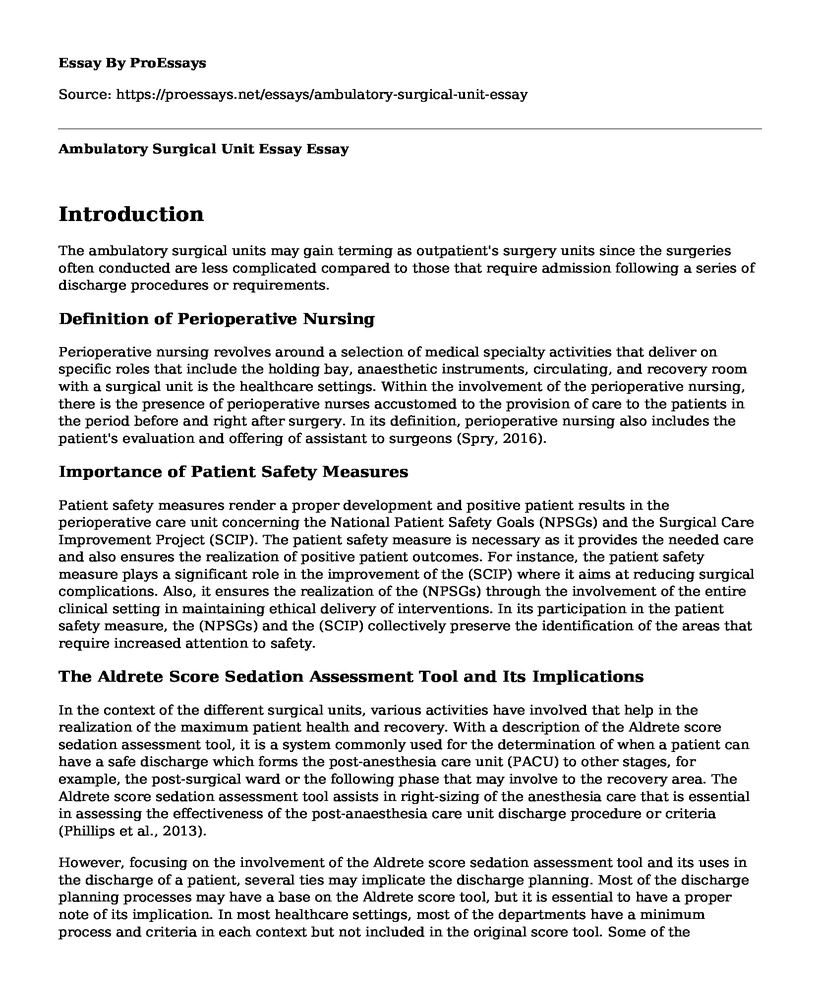Introduction
The ambulatory surgical units may gain terming as outpatient's surgery units since the surgeries often conducted are less complicated compared to those that require admission following a series of discharge procedures or requirements.
Definition of Perioperative Nursing
Perioperative nursing revolves around a selection of medical specialty activities that deliver on specific roles that include the holding bay, anaesthetic instruments, circulating, and recovery room with a surgical unit is the healthcare settings. Within the involvement of the perioperative nursing, there is the presence of perioperative nurses accustomed to the provision of care to the patients in the period before and right after surgery. In its definition, perioperative nursing also includes the patient's evaluation and offering of assistant to surgeons (Spry, 2016).
Importance of Patient Safety Measures
Patient safety measures render a proper development and positive patient results in the perioperative care unit concerning the National Patient Safety Goals (NPSGs) and the Surgical Care Improvement Project (SCIP). The patient safety measure is necessary as it provides the needed care and also ensures the realization of positive patient outcomes. For instance, the patient safety measure plays a significant role in the improvement of the (SCIP) where it aims at reducing surgical complications. Also, it ensures the realization of the (NPSGs) through the involvement of the entire clinical setting in maintaining ethical delivery of interventions. In its participation in the patient safety measure, the (NPSGs) and the (SCIP) collectively preserve the identification of the areas that require increased attention to safety.
The Aldrete Score Sedation Assessment Tool and Its Implications
In the context of the different surgical units, various activities have involved that help in the realization of the maximum patient health and recovery. With a description of the Aldrete score sedation assessment tool, it is a system commonly used for the determination of when a patient can have a safe discharge which forms the post-anesthesia care unit (PACU) to other stages, for example, the post-surgical ward or the following phase that may involve to the recovery area. The Aldrete score sedation assessment tool assists in right-sizing of the anesthesia care that is essential in assessing the effectiveness of the post-anaesthesia care unit discharge procedure or criteria (Phillips et al., 2013).
However, focusing on the involvement of the Aldrete score sedation assessment tool and its uses in the discharge of a patient, several ties may implicate the discharge planning. Most of the discharge planning processes may have a base on the Aldrete score tool, but it is essential to have a proper note of its implication. In most healthcare settings, most of the departments have a minimum process and criteria in each context but not included in the original score tool. Some of the implications may arise as a result of premorbid occurrences and conditions during the event of the assessment concerning the Aldrete score sedation. For instance, the causal anaesthesia may affect the limb movement. Also, the urine output, oral intake and the blood results are rarely present in the assessment or the score tools.
Informed Consent and Its Importance in Patient Education Before Surgical Procedure
Informed consent involves a process whereby a patient is made aware and understands the aims, benefits and the risks that may occur as a result of surgical interventions. The patient then agrees to receive the treatment which requires the affected party of the patient to sign a statement confirming on their understanding concerning the benefits and risks of the surgical intervention.
In the context of the informed consent, it is essential in the patient education before any surgical procedure whereby it helps the patient understand the benefits and the risks that he or she may face through the medical intervention. In most cases if not every case, it helps in the decision-making process. Also, the informed consent relies on the importance where it renders a balance as to whether or not a patient would accept surgery if they had the knowledge and understood the possible complications and risks (Anderson & Wearne, 2007).
References
Anderson, O. A., & Wearne, I. M. J. (2007). Informed consent for elective surgery-what is best practice? Journal of the Royal Society of Medicine, 100(2), 97-100.
Phillips, N. M., Street, M., Kent, B., Haesler, E., & Cadeddu, M. (2013). Postanaesthetic discharge scoring criteria: key findings from a systematic review. International Journal of EvidenceBased Healthcare, 11(4), 275-284.
Spry, C. (2016). Essentials of perioperative nursing. Jones & Bartlett Publishers.
Cite this page
Ambulatory Surgical Unit Essay. (2022, Apr 04). Retrieved from https://proessays.net/essays/ambulatory-surgical-unit-essay
If you are the original author of this essay and no longer wish to have it published on the ProEssays website, please click below to request its removal:
- Communication in Public Health. Essay Example.
- Scholar-Practitioner Project on Lung Cancer Paper Example
- State-Specific Regulations on NPs Paper Example
- Essay on Inclusive Education: Achieving Social & Academic Success for Children With Disabilities
- Research Paper on UCSF Liver Transplant: A Second Chance for Life-Saving Care
- Essay on AHIMA: Nonprofit for Health Information Management Professionals
- Willowbrook: A Study of Infectious Disease & Mental Health - Report Sample







